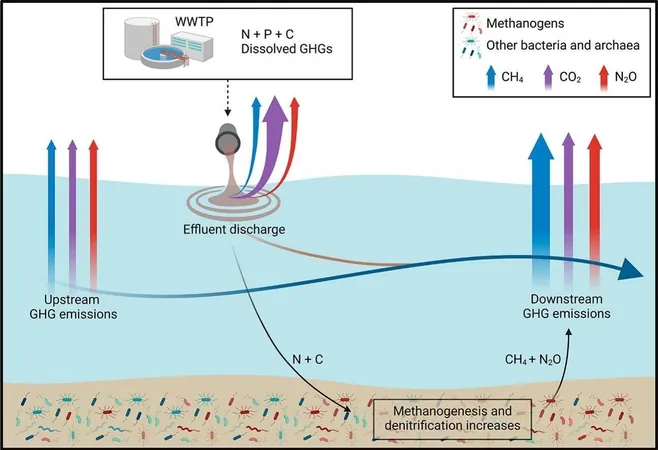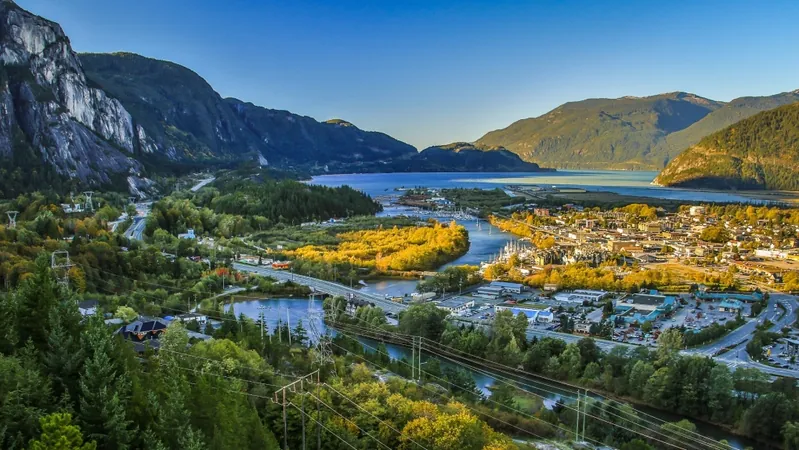
Shocking Discovery: Treated Wastewater Turns River into Methane Hotspot!
2024-11-15
Author: Olivia
Shocking Discovery: Treated Wastewater Turns River into Methane Hotspot!
A recent groundbreaking study has revealed alarming findings about the environmental impact of treated wastewater on river ecosystems. Researchers from Radboud University, Ida Peterse and Lisanne Hendriks, found that a stretch of river receiving treated water emits a staggering five times more methane compared to areas without such discharges. This crucial research was published in the respected journal Science of The Total Environment.
To uncover this unsettling trend, microbiologist Peterse and ecologist Hendriks meticulously measured methane emissions at various locations along the Linge and Kromme Rijn rivers. “We used a floating chamber to capture the gases escaping from the river’s surface and thoroughly analyzed them,” explained Peterse. The team's findings indicate that the phenomenon continues to escalate significantly further downstream.
The scientists conducted their study by taking samples from areas 500 meters before the wastewater treatment plant, directly at the discharge point, and up to two kilometers downstream. What they discovered was shocking: two kilometers past the discharge point, methane emissions peaked at rates five times higher than those measured at the point of discharge itself.
A Deeper Dive into the Data
The implications of this study are profound. While the treated wastewater meets Dutch quality standards, the nutrient-rich effluent has a significant impact on the river’s ecosystem. Hendriks noted, “Treated water still contains nitrogen, phosphate, and carbon. These nutrients promote the growth of algae, which eventually die and sink to the riverbed. This decay creates an ideal environment for methane-producing microorganisms.”
What’s particularly concerning is that the increased methane emissions are not immediately apparent after the wastewater is discharged. The delayed rise in emissions signals a long-term ecological threat. As gasses bubble up from the sediment, rivers could transform into potent sources of methane—a greenhouse gas far more effective at trapping heat in the atmosphere than carbon dioxide.
This study raises essential questions about the sustainability of current wastewater management practices. As global efforts to combat climate change intensify, it becomes increasingly vital to scrutinize the impacts of seemingly 'clean' discharges on our waterways.
In light of these findings, we may need to rethink how wastewater is treated and explore alternative methods to mitigate its effects on delicate river ecosystems. As researchers continue to probe this issue, citizens and policymakers alike must confront the reality that our rivers may be facing unexpected dangers from the very systems designed to protect them. What other hidden threats could be lurking in our waterways? Stay tuned for more updates!









 Brasil (PT)
Brasil (PT)
 Canada (EN)
Canada (EN)
 Chile (ES)
Chile (ES)
 España (ES)
España (ES)
 France (FR)
France (FR)
 Hong Kong (EN)
Hong Kong (EN)
 Italia (IT)
Italia (IT)
 日本 (JA)
日本 (JA)
 Magyarország (HU)
Magyarország (HU)
 Norge (NO)
Norge (NO)
 Polska (PL)
Polska (PL)
 Schweiz (DE)
Schweiz (DE)
 Singapore (EN)
Singapore (EN)
 Sverige (SV)
Sverige (SV)
 Suomi (FI)
Suomi (FI)
 Türkiye (TR)
Türkiye (TR)